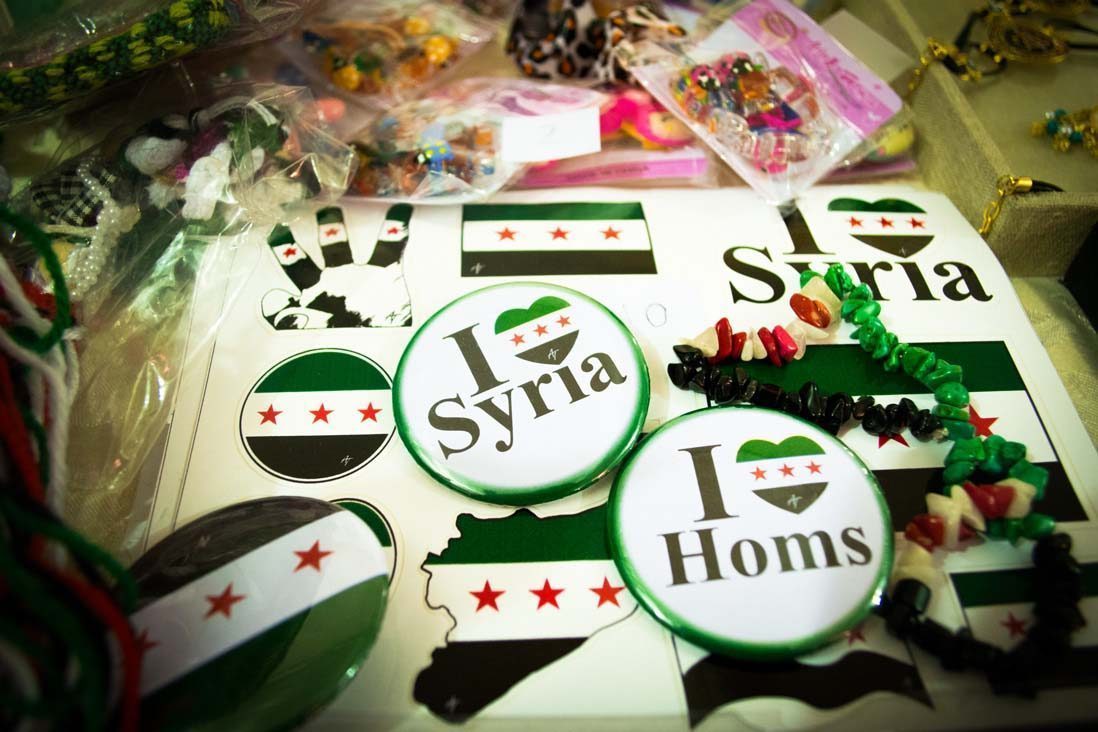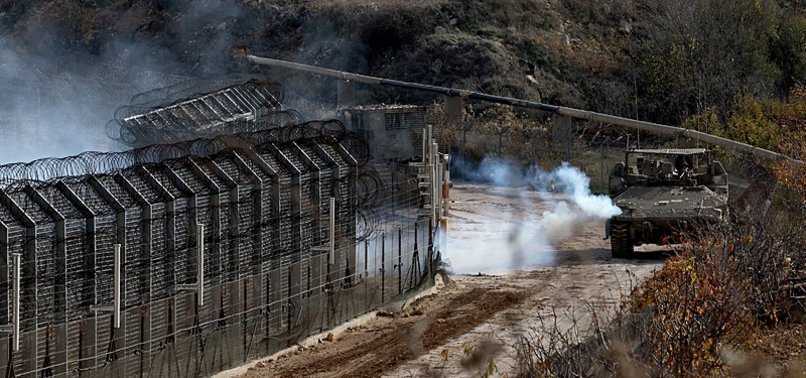
Inside a tent at Al Gharafa Sports Club, Umm Muhammad sits behind a pair of tables laden with stuffed grapevine leaves, spinach and zaatar-filled pastries, mini pizzas and other Syrian dishes.
The 53-year-old homemaker dons a pair of gloves and peels back the plastic wrap covering a plate of grilled Homs-style kibbeh, which she sells to customers for QR8 a piece.
Speaking to Doha News, the Syrian expat, who is the breadwinner for her family of five said:
“I do not want to live on handouts. I want to be able to feed my family in a dignified manner.”
In booths around her, others are selling Syrian handicrafts, clothes, scarves, soaps and olive oil, primarily to raise money to help those inside the war-torn country. Events like these have been held in Qatar since Syria’s civil war began in 2011.

Some of the proceeds, however, are earmarked to stay in Doha to support Syrians who have sought safety in the Gulf country. Because of their unique immigration status, many are unable to work and rely on such fundraising events for income.
Speaking to Doha News, many local Syrians have praised the support they’ve received from the Qatari government, which has loosened its immigration rules, provided and funded a school and given coalition forces full diplomatic status in Doha.
But financial hardships and bureaucratic hurdles remain a part of daily life, as Qatar is hesitant to give residency permits to Syrians whose loyalties it cannot ascertain.
Lacking RPs, young Syrians here have trouble obtaining the credentials required by many universities, while their parents – who don’t have work permits – struggle to afford Doha’s high cost of living.
Those like Umm Muhammad, whose daughter is an engineer but cannot find work on a visitor visa, and whose husband’s health bills are piling up in the absence of a health card, are emblematic of the Syrian plight here.
“I do not want anyone to give me fish. I want the fishing rod,” the expat told Doha News in Arabic. “This fishing rod is a residency that will help my family and me. My children need to be able to find work and education. I am grateful to be living safely in Qatar, but we need residencies to make this complete.”
Coming to Qatar
According to representatives of the Syrian embassy in Qatar, there are more than 40,000 Syrian expats living here with residency permits. The number of Syrians on visitor visas is more than 20,000, including men, women and children.
The officials added that since the new embassy in March 2013, they have processed 2,700 applications of Syrians seeking passage to Qatar. Each request accounts for an average of four people (i.e. a man who lives here can petition for his wife and children, and his children’s spouses and their offspring), but can go include up to six or seven individuals.
Syrian professionals and laborers have lived in Qatar for decades. But more have been moving here since 2011, when mass protests against the Syrian President Bashar Al Assad sparked a civil war there.

Since then, Qatar has provided military and financial support to rebel forces, permitted protests in Doha against the Syrian government, opened a new embassy here staffed by opposition members – and faced several cyber attacks and smear campaigns from Al Assad loyalists.
Qatar has also allowed Syrians who were already sponsored and working here to bring in their immediate relatives.
That’s how Umm Muhammad, whose daughter had lived in Qatar for four years prior to the conflict, arrived here. She said she was reluctant to leave her home until her children began receiving threats and injuries at the hands of regime forces:
“My son Muhammad was wounded by bullet in his leg during one of the air raids. I could not take him to the hospital for fear of his arrest. His father extracted the bullet out of his leg at home. It was horrible … This is why we had to leave Syria.”
As the situation in that country worsened, the Qatar government allowed local Syrians to apply to bring in relatives beyond their immediate family.
However, these applications are approved on a case-by-case basis and can take months to process, as embassy and government officials investigate whether the applicant poses a security risk, among other factors.

One Syrian, a 25-year-old male who went by the alias Nuruddin, said his cousin had been waiting for more than a year.
Once in Qatar, the Syrians are granted a visitor visa that can be renewed inside the country for QR200, exempting them from leaving Qatar and coming back, as many other long-term “visitors” must do, embassy officials said.
This appears to be a change from last year, when many visitors reported having to go off the grid once their visitor visas expired.
Nasr Abu Nabot, the First Secretary at the Syrian embassy in Qatar, told Doha News that Syrians in Qatar have a different legal status than what’s typically given by other countries:
“More people choose to come to Qatar to avoid bearing the stigma of being a refugee,” he said.
However, the inability to work on a visitor visa means many Syrians in Qatar face financial hardships.
Wanting to work
The high cost of living and a shortage of affordable housing in Qatar hits Syrians in this country particularly hard. Abu Nabot said many of these expats were already living in shared accommodations or modest company housing before bringing their family members into the country.
The financial difficulties have prompted several Syrians in Qatar – including 42-year-old Umm Anas – to form a support group called Takaful (Solidarity), which started off by providing moral support to those in need.
Speaking to Doha News, Umm Anas said:
“The first family we visited was extremely impoverished. They lived in an unsanitary place, no furniture, nothing. It was in one of those partitioned villas. The garage was turned into living space … In the summer it was so hot and humid … In the winter, the ceiling dripped water whenever it rained and it was also cold. This is not to even mention how high the rent was for this hole.”
After Umm Anas shared this story with others, “support started pouring in,” she said. People gave clothes and household goods, and some Qataris donated their monthly government-provided food provisions.

Her group currently assists some 30 families by providing clothes, kitchenware, furniture, baby supplies, electric appliances and occasionally money from donors of various nationalities.
Other charities and support groups, meanwhile, are helping Syrians pay for health care.
Abu Nabot said he’s exploring more sustainable solutions, specifically allowing Syrians to work in Qatar.
He added that he is currently negotiating with the Ministry of Labor and Social Affairs to grant residence permits to skilled Syrian professionals, which would allow them to find work.
If that fails, Abu Nabot said his next request would be for the ministry to allow the embassy to issue work permits.
Though the details are still being ironed out, his proposal would effectively create a new immigration category that lets individuals work without the benefits that come with full residency status, such as a health card, housing and plane tickets home.
The embassy would match Syrian business owners with Syrian workers, who would receive both a financial and psychological boost, according to Abu Nabot:
“Syrians are very proud people. If you give them the option of receiving a monthly salary while sitting at home or working a job while receiving less money, they’ll choose the latter. (This proposal) would make a huge moral difference.”
Students ‘traumatized’
One of the most commonly voiced frustrations among Syrians in Qatar in recent years is the difficulty educating children, even for those who can afford tuition. According to the Supreme Education Council, it is illegal for students without residency permits to attend schools in Qatar.
Last year, the local Syrian community was granted a school in Duhail by Emiri decree. The Supreme Education Council agreed to pay the school’s Syrian teachers and provide them with accommodation so that tuition could be free.
The school recently completed its first academic year with approximately 750 students between the ages of six and 17 years old, Abu Nabot said.

However, the continuous influx of Syrians escaping the violence in their home country means that the facility has been bursting at the seams.
Abu Nabot said he’s submitted a request to the SEC for another school, but may have to resort to renting a villa and charging those families who can afford it tuition.
Beyond a growing population, there are other challenges trying to educate children who are growing up in a time of conflict and regime change.
Huda Al-Youssef, a 30-year-old teacher who was recruited from Syria to work at the Duhail school, said many children would benefit from seeing a psychologist, and the school needs more social workers:
“Some of the students are traumatized. You can see it in their drawings. They draw army tanks and air raids. In class, the slightest outside noise might trigger a reaction from the students. They are sensitive to loud noises. I feel that some of them are emotionally still stuck in the environment of the war.”
Additionally, many children have missed years of education since the war started and have fallen behind. Meanwhile, coalition forces in Syria are rewriting the national curriculum to expunge what it deems is propaganda for Al Assad’s regime in history and civics lessons.
In the interim, that means the school in Duhail is not accredited, so students who graduate do not get high school diplomas.
While Syrian officials are working with the United Nations to sort out this issue, older students are encountering challenges while trying to switch schools here.
“After they left school this year, the students without residencies will not be able to join any of Qatar’s independent schools to receive a high-school diploma and will miss out on university,” said Al-Youssef, who hails from the Syrian city of Aleppo.
Though many Syrians are appreciative for the reprieve they’ve been granted here, Abu Nabot said the crisis at home has left all his compatriots in Qatar – even those who have been in the country for years, and have stable employment – with a sense of insecurity, as they fret about the fate of family members, neighbors and their home country.
“People are in a constant state of worry and fear, especially since there is no sense that there’s a solution on the horizon,” he said.
Thoughts?







